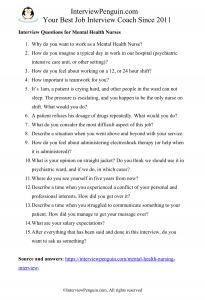After many years of hard studies, you earned your Nursing degree. Now you finally meet all legal requirements to apply for one of the highest paying nursing jobs in the world–psychiatric (mental health) nurse.
Just one last step remains–the interview. Once you pass your final test, you will start doing the work you always wanted to do, caring for psychiatric patients. I will show you what to expect in this interview, what questions they will ask you, and how you should answer them to succeed. Enjoy!
Table of Contents
Competition won’t be extremely tough
Good news is that you won’t compete with dozens other applicants for the job (which would be the case if you wanted to work as a Pharmacist, or a Bank Teller for example).
More people are diagnosed with psychiatric disorders each year. On the top of that, vast majority of these people remain patients for their entire life. Nurses are in demand, and they will continue to be.
Therefor it may easily happen that you will compete only with 2-3 other people in your interview, or–in rare cases, even with nobody. In such a case it’s not about proving to be the best. It’s simply about proving that you know what psychiatric nursing is about, that you really want the job, and are ready for all difficulties it presents.
In many cases, the interviewers will pray that you do well, that you don’t disappoint in your interview. They want you, they need you, and they hope to hire you.
I wanted to write this to help you relax. This isn’t the most difficult interview in the world (though it isn’t an easy one either). Relax, be yourself, and show motivation. Things will be fine. Let’s have a look at the questions they may ask you.
Why do you want to work as a Mental Health Nurse?
You should not refer to the past, saying that you want this job because you’ve earned your degree in the field. It would indicate a must, something you had to do and not wanted to. You should rather focus on the present and the future.
You can say that you register the development in our society, how all kinds of mental illnesses are on the rise, and feel a calling to help these people, and perhaps even help to stop the trend (though it will be very tough to stop it).
You can also say that you feel very close to psychiatric patients (perhaps someone in your family suffers from depression or schizophrenia), and that’s your motivation to learn more about the field, and to be active in it in your working life.
How do you imagine a typical day in work in our hospital (psychiatric intensive care unit, prison, other setting)?
The key is to show the interviewers that you see the complexity of this role, and all things it encompasses. Mental health nursing isn’t only about administering drugs, and watching whether patients do not fight each other in the ward.
It’s much more than that.
Say that you plan to talk to patients, trying to understand their physical, social, and emotional needs, and provide assistance whenever you can. Say that you plan to visit the rooms regularly, and won’t just sit in your office waiting for a buzzer to ring.
Reading the job description should also help you to understand your typical day in work…
How do you feel about working on a 12, or 24 hour shift?
Each job has some drawbacks. With nursing, perhaps the biggest drawback are long shifts, which are physically and mentally demanding.
Now, you should not wear pink glasses, saying that you will handle it will ease. It’s not as simple as that, and having unrealistic expectations about the difficulty of the job won’t help you in your interview.
Oppositely, you should say that you know it will be tough. Say that you expect to be tired on such a long shift, and will need your best to maintain concentration and stay vigilant. Nevertheless, you know this belongs to the job, and count with it, and unless you felt ready to handle long shifts (or at least to try to handle them), you would not apply for the job.
How important is teamwork for you?
In most hospital and community sittings you will share a room with several other nurses. You will cooperate together. For this reason, you can expect at least one question about teamwork, or about sharing office with someone, or about a good/bad colleague (Describe an ideal colleague, how do you feel about spending most of your time with another nurse, etc).
You should stress the importance of teamwork, and you should also say that you hope to support your fellow nurses in difficult times, that you hope to have good cooperation together. Nursing is not an easy profession, and shifts are better when you have nice colleagues around you…
It’s 1am, a patient is crying hard, and other people in the ward can not sleep. The pressure is escalating, and you happen to be the only nurse on shift. What will you do?
You may get several situational (behavioral) questions in your interview, and consider this one just an example. However, the key is to always show the right attitude, and offer a simple plan on how to address the situation.
In this particular case, you can say that as a first step you’d try to calm the patient down, talk to them, help them relax and fall asleep. If that doesn’t work, however, you should proceed with sedatives (pills or injection), while trying to restore the peace in the ward….
A patient refuses his dosage of drugs repeatedly. What would you do?
This is a tricky situation. First and foremost you must consider whether the patient is in a hospital voluntarily, or whether they are obliged to stay (by police or other legal body, conditions and rules for this change from one country to another—check it before your interview).
If they undergo a voluntary treatment, you can not force them to swallow the pills. But you should give them a paper to sign, confirming that they refused the drugs. This moves the responsibility for the consequences on their shoulders.
You can also say that you will always try to explain the patient how the drugs help them, and why they should take them.
Other questions you may get in your mental health nursing interview
- What do you consider the most difficult aspect of this job?
- Imagine that one of the patients fell in love with you. They are very sensitive and your refusal could have fatal effects on their mental condition. What would you do?
- Describe a situation when you went above and beyond with your service for a patient.
- Do you suffer from any mental health issue, or is someone in your family suffering from one?
- In your opinion, what are the most common mental and emotional problems children face nowadays?
- What are your strengths and weaknesses as a nurse?
- Violence is increasing in our society, including fatal incidents. What can you do about it as a mental health nurse?
- What do you expect from psychiatrists and other healthcare professional who share the workplace with you?
- Describe a time when you experienced a conflict of your personal and professional interests. How did you get over it?
- Describe a time when you struggled to communicate something to your patient. How did you manage to get your message over?
- ………..
Conclusion, great answers to all questions
Interview in mental health nursing belongs to job interviews with average difficulty. Nurses are in high demand, which makes your situation easier.
As long as you offer at least decent answers to all their questions, they will give you a chance to prove your skills during probation period in the hospital/clinic/prison/community center.
Nevertheless, you should not underestimate your preparation, and the questions won’t be easy. If you are not sure how to answer them, or experience anxiety, have a look at a new eBook I wrote for you, the Mental Health Nurse Interview Guide. In includes multiple great answers to all 25 most common mental health nursing interview questions, (+ more). Streamline your interview preparation, and ensure that you will have an answer ready for everything that may happen in this interview.
Thank you for checking out the eBook, and I wish you good luck in your interview!
Matthew
* Alternatively you can also download the list of all questions in a one page long PDF document, and practice your interview answers anytime later, even when offline:

May also interest you:
- Nursing interview questions – Education, experience, attitude, or motivation? Which one matters the most in nursing job interview? Advice for all kinds of nursing jobs, and a must read for every responsible job seekers.
- Mental health counselor interview questions.
- Pediatric nurse interview questions.


